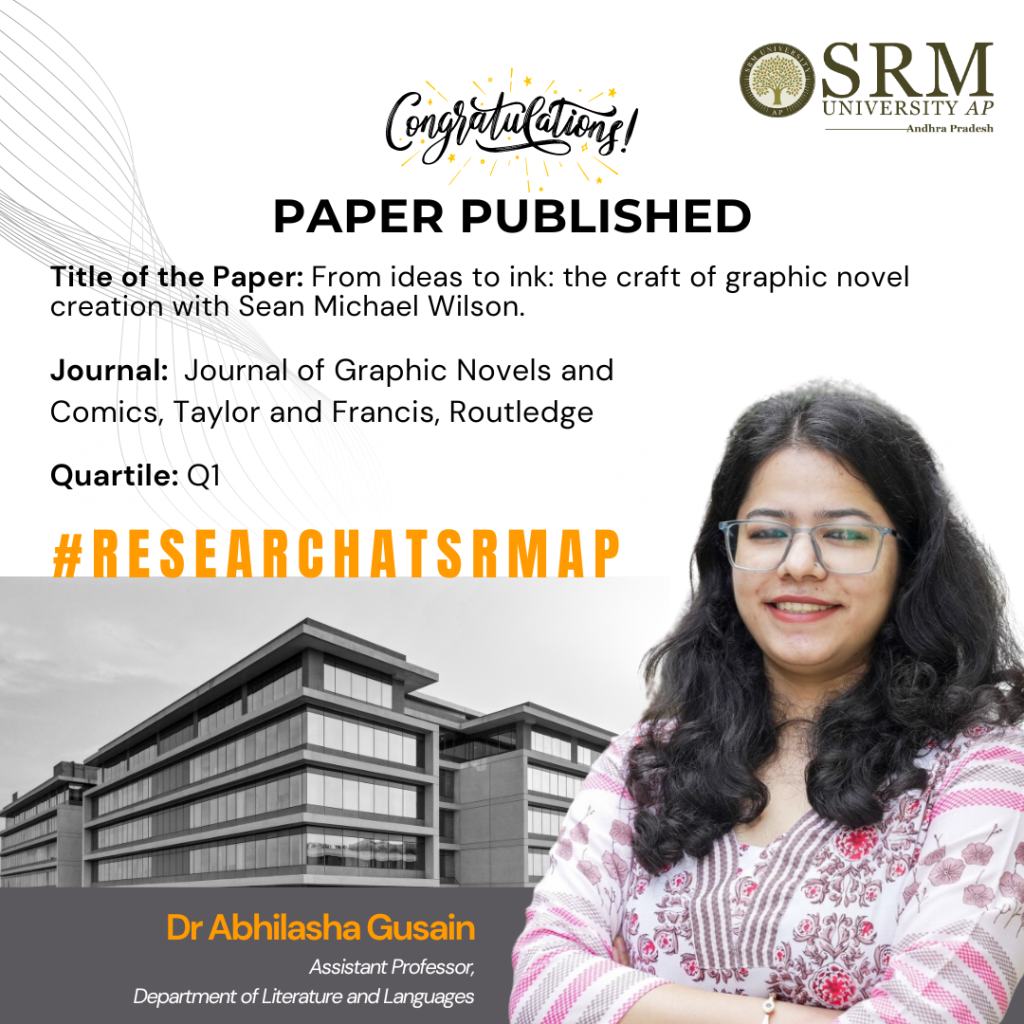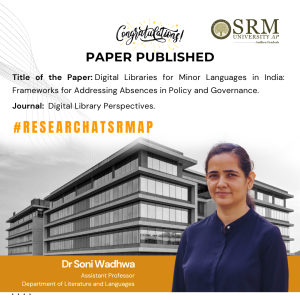- A Look into Sequential Art: Exploring Sean Michael Wilson’s Graphic Creations August 5, 2024

Graphic novels, a subgenre of comics, have witnessed stellar growth in popularity, encouraging readers to decipher meaning from the text and the images. The combination of visual and textual storytelling aids readers in decoding complex narratives. Dr Abhilasha Gusain, Assistant Professor from the Department of Literature and Languages, has published a paper titled “From Ideas to Ink: The Craft of Graphic Novel Creation with Sean Michael Wilson” in the Journal of Graphic Novels and Comics.
The current research advances the field of comics studies, highlighting aspects related to the industry like readership, publication, and distribution of graphic narratives across the globe. It emphasises the process of creation of a graphic novel, with reference to author Sean Michael Wilson’s works.
Abstract
In this interview, Sean Michael Wilson delves into his multifaceted career as a graphic novel writer, revealing the intricacies of his creative process, the challenges of adapting complex subjects into visual narratives, and the evolving role of graphic novels in cultural discourse. With over 40 projects under his belt, Wilson shares his approach to beginning new works, whether they stem from original ideas or/are adaptations of historical events and existing literature. He discusses the balance between authenticity and readability, the importance of research, and the collaborative dynamic between writer and artist in bringing graphic novels to life. Wilson also touches on the broader implications of graphic novels in education and social commentary, the economic realities of the industry, and the impact of digital platforms on publishing. His experiences across different cultures, particularly between the West and Japan, provide insight into the global reception of his work. Throughout the interview, Wilson emphasises the power of graphic novels as a medium for storytelling, education, and political engagement.
Continue reading → - Dr Soni Wadhwa Publishes Paper on Digital Libraries for Minor Languages in India July 18, 2024
 In a significant academic achievement, Dr Soni Wadhwa, Assistant Professor in the Department of Literature and Languages, has recently published a paper titled “Digital Libraries for Minor Languages in India: Frameworks for Addressing Absences in Policy and Governance.” The paper was published in the esteemed Journal Digital Library Perspectives. Dr Wadhwa’s research illuminates the importance of establishing digital libraries for minor languages in India and proposes frameworks to address existing gaps in policy and governance. This pioneering work not only explores the significance of preserving linguistic diversity but also advocates for inclusive and accessible digital resources for all.
In a significant academic achievement, Dr Soni Wadhwa, Assistant Professor in the Department of Literature and Languages, has recently published a paper titled “Digital Libraries for Minor Languages in India: Frameworks for Addressing Absences in Policy and Governance.” The paper was published in the esteemed Journal Digital Library Perspectives. Dr Wadhwa’s research illuminates the importance of establishing digital libraries for minor languages in India and proposes frameworks to address existing gaps in policy and governance. This pioneering work not only explores the significance of preserving linguistic diversity but also advocates for inclusive and accessible digital resources for all.The publication of this paper not only adds to Dr Wadhwa’s scholarly contributions but also highlights the commitment of SRM University-AP faculty members to engaging in research that can have a positive impact on society.
Abstract
This study aims to deliberate on strategies for enlisting community support for gathering diverse learning resources in different languages and for enlisting participation in activities such as crowdsourcing in initiatives such as annotations and transliteration. This paper calls for interventions that imagine and create infrastructure for the flourishing of smaller libraries that can draw from and feed into large-scale national and international libraries. Offering a conceptual framework to rethink the country’s approach toward minor languages, it first offers an overview of policies and initiatives relevant to the concerns of minor languages in digital libraries in India. Based on the policy analysis, it then goes on to suggest starting points for policy designers and custodians of libraries to help them work toward better representation of languages in their resources.The existing frameworks analyzed here for the greater or representation of minor Indian languages reveal a culture of silence toward the issue of language. With some advocacy, these frameworks can be mined to craft different ways that are critical not just for enriching libraries but also for preservation of cultural heritage of the communities concerned, thus adding a larger social dimension to the question of access.
Explanation of the Research in Layperson’s terms
Given that Indian languages in general are under-represented on the internet and that languages of minority linguistic groups find very little space on digital platforms, it is imperative for institutions such as libraries to cater to smaller communities and their educational needs while also reaching out to them in their own languages. While a lot of socio-political discourse on minority languages in India exists, this study pushes for their bearing on digital libraries, educational frameworks and cultural heritage. It offers five suggestions for strengthening the presence of minor languages in digital libraries in India.Details in citation format
Wadhwa, S. (2024), “Digital libraries for minor languages in India: frameworks for addressing absences in policy and governance”, Digital Library Perspectives, Vol. ahead-of-print No. ahead-of-print. https://doi.org/10.1108/DLP-01-2024-0002Practical Implications
This viewpoint paper can be used to enhance policy and governance around libraries. With National Education Policy 2020, which emphasises the importance of learning in regional/mother/Indian languages, Indian educational system as well as social institutions need stronger platforms to make resources in Indian languages available to students as well as lifelong learners. With more of such research, it will be possible to come up better digital infrastructure for Indian languages.Social Implications
Indian languages are not widely represented on the Internet and in the knowledge set up. Making existing resources and knowledge available in digital libraries will stimulate further research on generating further research and knowledge production in Indian languages. It is hoped that more research in the domain of Indian languages works towards the digital divide and knowledge divide in India.Collaborations
This research came out of the researcher’s previous archival work. Her digital archive PG Sindhi Library is dedicated to post-partition Sindhi writing in India. This article is based on an invited talk delivered at the international symposium titled “Digital Libraries: Sustainable Development in Education” held at IIT Kharagpur in India in November 2023. The author is grateful to the organisers and fellow participants for their feedback.Future Research Plans
Continue reading →
The researcher is involved in a sanctioned project titled “Sindhi Sanchaya: Building a Comprehensive and Interactive Database of a Partitioned Literature” funded by IIT Indore. She hopes to build on this work produced in this article as she makes progress in the project.

